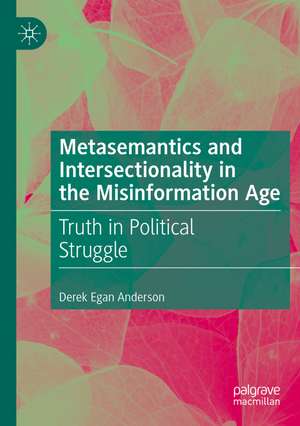Metasemantics and Intersectionality in the Misinformation Age: Truth in Political Struggle
Autor Derek Egan Andersonen Limba Engleză Paperback – 5 sep 2022
| Toate formatele și edițiile | Preț | Express |
|---|---|---|
| Paperback (1) | 487.96 lei 43-57 zile | |
| Springer International Publishing – 5 sep 2022 | 487.96 lei 43-57 zile | |
| Hardback (1) | 589.51 lei 43-57 zile | |
| Springer International Publishing – 4 sep 2021 | 589.51 lei 43-57 zile |
Preț: 487.96 lei
Nou
Puncte Express: 732
Preț estimativ în valută:
93.38€ • 96.94$ • 77.87£
93.38€ • 96.94$ • 77.87£
Carte tipărită la comandă
Livrare economică 24 martie-07 aprilie
Preluare comenzi: 021 569.72.76
Specificații
ISBN-13: 9783030733414
ISBN-10: 3030733416
Pagini: 336
Ilustrații: XIII, 336 p.
Dimensiuni: 148 x 210 mm
Greutate: 0.42 kg
Ediția:1st ed. 2021
Editura: Springer International Publishing
Colecția Palgrave Macmillan
Locul publicării:Cham, Switzerland
ISBN-10: 3030733416
Pagini: 336
Ilustrații: XIII, 336 p.
Dimensiuni: 148 x 210 mm
Greutate: 0.42 kg
Ediția:1st ed. 2021
Editura: Springer International Publishing
Colecția Palgrave Macmillan
Locul publicării:Cham, Switzerland
Cuprins
Chapter 1: Introduction: Truth in Political Struggle.- Chapter 2: Politically Contested Terminology.- Chapter 3: On the Possibility of Semantic Corruption.- Chapter 4: Toward a Conception of Misinformation as Epistemic Violence.- Chapter 5: Model-Theoretic Semantics for Politically Contested Terminology.- Chapter 6: Toward an Intersectional Metasemantics.- Chapter 7: Power and Regimes of Truth.- Chapter 8: An Analytic Philosopher’s Unified Theory of Intersectionality.- Chapter 9: Intersectional Metasemantic Adequacy.- Chapter 10: A Metasemantics for Intersectionality.- Chapter 11: Situated Knowledge and the Regime of Truth.
Notă biografică
Derek Egan Anderson is a lecturer in the philosophy department at Boston University, USA.
Textul de pe ultima copertă
“I am extremely excited to see this book. Debates about language—words like
‘woman’ and ‘racism’—have been absolutely central to vital political issues for
some time. They have also been weaponised, used to argue that important issues
are “just about language.” This book takes these debates seriously—both
politically and linguistically. It is wonderfully wide-ranging, deeply grounded in
both intersectional theory and analytic philosophy of language. We’ve been
needing a book like this for a long time!”
—Jennifer Saul, University of Waterloo, Canada.
“This timely work draws together various themes—knowledge and oppression,
truth and misinformation, language and power—and grounds them in a
discussion of practical issues that should concern us all. Bridging conversations
in linguistics and politics, this book is a long overdue and necessary complement
to debates that examine the intersection of the political with other philosophical
sub-disciplines, like epistemology and ethics. To come across a work that reveals
something you have understood but have been unable to express, that examines
how language can empower and disempower, is both exciting and will speak to
many who have felt themselves silenced without fully understanding why.”
—Briana Toole, Claremont McKenna College, USA
“A truly impressive melding of hard-core analytic philosophy and serious politics.”
—Naomi Scheman, University of Minnesota, USA
This book investigates the impact of misinformation and the role of truth in
political struggle. It develops a theory of objective truth for political controversy
over topics such as racism and gender, based on the insights of intersectionality,
the Black feminist theory of interlocking systems of oppression. Truth is defined
using the tools of model theory and formal semantics, but the theory also
captures how social power dynamics strongly influence the operation of the
concept of truth within the social fabric. Systemic ignorance, propagated through
false speech and misinformation, sustains oppressive power structures and
perpetuates systemic inequity. Truth tends to empower marginalized groups
precisely because oppressive systems are maintained through systemic ignorance.
If the truth sets people free, then power will work to obscure it. Hence, the rise of
misinformation as a political weapon is a strategy of dominant power toundermine the political advancement of marginalized groups.
Derek Egan Anderson is a lecturer in the philosophy department at Boston
University, USA.
Caracteristici
Develops a theory of objective truth for politically controversial topics Shows how truth can transcend social and political divisions while also explaining the effects of power and oppression in producing ignorance, misinformation, and political echo chambers Uses a framework of intersectionality to create a theory of truth that diverges in radical ways from mainstream analytic philosophy, yet maintains core elements of the analytic style
